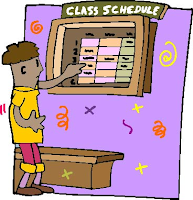“Do Those Who Teach Also Play Well?”
 Busy week here at Hard-Boiled Poker.
Busy week here at Hard-Boiled Poker. My American Studies class, “Poker in American Film and Culture,” has now met a few times and I think we’re off to a good start.
I might have mentioned that we missed the first week thanks to inclement weather, and so have been playing from behind (so to speak) here during the first few meetings as we try to catch up with the syllabus. We’re back on schedule now, though, and soon I’ll be handing out the first essay assignment.
Wanted to share one quick anecdote from the first few classes. On the first day we met we spent time both talking about the course purposes -- the primary one being to try to learn more about American history and culture by examining many stories (both true and fictional) about poker -- and getting to know each other a bit, too.
One student when introducing himself mentioned his interest in gambling and poker -- shared by many (but not all) of the students -- adding something about how the class might perhaps help him learn how to win more. That gave me an opportunity to make a disclaimer I had thought about making earlier but had not yet made.
With a laugh I noted that while I did think everyone would get something beneficial from the class, I wasn’t going to pretend to promise to teach anyone how to become better poker players! We would be encountering some strategy advice in some of our readings, I explained, but the class was really more about studying American history and culture (and learning how to interpret stories and films) than learning how to play the game successfully.
 Reminds a little of a chapter in a book I recently finished, one by a 16th-century Italian named Girolamo Cardano called Liber de Lude Aleae (Book on Games of Chance). James McManus mentions the book in one of the early chapters in Cowboys Full (which we’ve been discussing in class), and being curious about it I tracked down a copy.
Reminds a little of a chapter in a book I recently finished, one by a 16th-century Italian named Girolamo Cardano called Liber de Lude Aleae (Book on Games of Chance). James McManus mentions the book in one of the early chapters in Cowboys Full (which we’ve been discussing in class), and being curious about it I tracked down a copy.The book discusses dice games, card games, and backgammon, and is thought by many to represent one of the earliest serious treatments of probability theory. Toward the end of the book Cardano has a chapter titled “Do Those Who Teach Also Play Well?” in which he admits (with some implied humility) that, no, teachers of the games he’s discussing don’t always make the best players. In fact, Cardano himself was apparently a pretty consistent loser as a gambler, even landed in debtor’s prison!
I ended up writing a bit about Cardano’s book today over on Betfair -- kind of a review, nearly 450 years late. Check it out, if you’re curious.
And while we’re on the whole “those who can, do, those who can’t, teach” subject, let me point you to my all-time favorite rejoinder to that bit of applesauce, as provided by Tommy Angelo. Click and be prepared to laugh.
Also this week Jen Newell and I weighed in on the relatively new PokerStars Women promotion over on Woman Poker Player with our monthly “He Said/She Said” column. We make different points, but both note how marketing to women only can present some challenges. Here’s what Jen said, and here’s my half of the discussion.
 Finally, I wanted to mention that I made another appearance on the Gambling Tales Podcast not too long ago -- Episode 22 (1/17/11). I chatted with Special K and Falstaff about that Rick Bennet novel, King of a Small World (1995), which I reviewed here a while back. A fun little discussion, which I hope might inspire a few more folks to check out Bennet’s nifty book.
Finally, I wanted to mention that I made another appearance on the Gambling Tales Podcast not too long ago -- Episode 22 (1/17/11). I chatted with Special K and Falstaff about that Rick Bennet novel, King of a Small World (1995), which I reviewed here a while back. A fun little discussion, which I hope might inspire a few more folks to check out Bennet’s nifty book. That’s all for now. Have to go come up with some good questions for essay topics! Enjoy the weekend, folks.
Labels: *the rumble, Gambling Tales Podcast, Girolamo Cardano, Tommy Angelo














0 Comments:
Post a Comment
<< Home